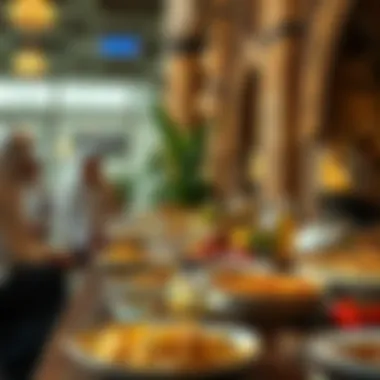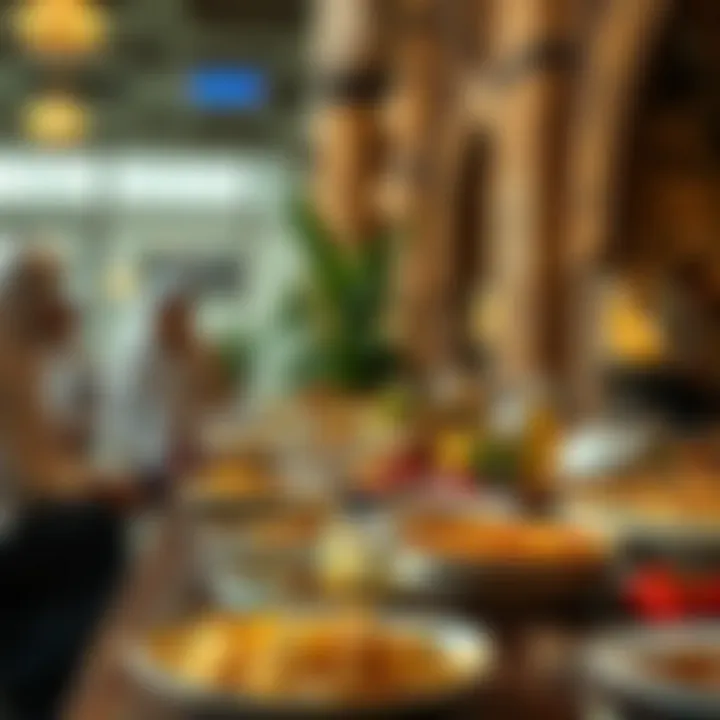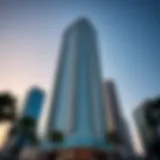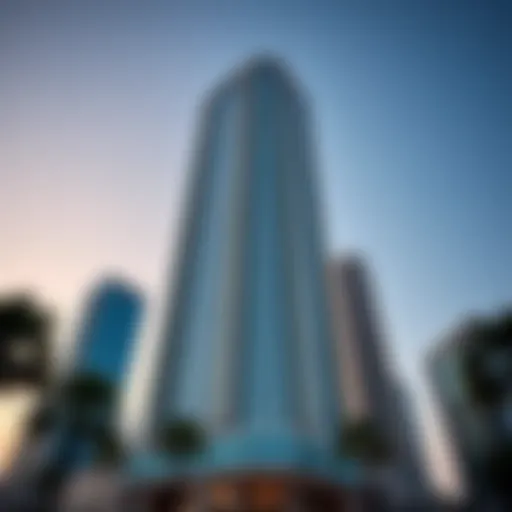Ramadan in Dubai: Cultural Insights and Real Estate Trends


Intro
In the heart of the Arabian Peninsula, Dubai stands as a spectacular beacon of cultural fusion and modern life. One of the most significant periods in its vibrant tapestry of traditions is Ramadan. This holy month carries profound meaning for the local population and expatriates alike. The practice is not just about fasting; it encapsulates a way of life, emphasizing community, reflection, and spiritual growth.
As the dates for Ramadan shift each year due to the lunar calendar, the year's specific dates have implications for daily routines, business operations, and social behaviors in Dubai. 2023 brings a unique opportunity to witness how these shifts affect not only personal habits but also real estate dynamics across the city.
For investors, agents, and residents, understanding Ramadan's cultural significance aids in grasping the subtleties of the market during this time. This article aims to guide you through the fascinating interplay between the holy month of Ramadan and the real estate landscape unique to this city, providing insights, trends, and the opportunities that arise as communities engage in shared traditions.
Ramadan Overview
Ramadan holds a vital place in the hearts and minds of Muslims globally, but in a bustling hub like Dubai, its significance unfolds in intricate and meaningful ways. This holy month, observed by fasting from dawn until dusk, transforms the city into a tapestry of cultural and spiritual richness. The timing of Ramadan changes yearly, depending on the lunar calendar, bringing with it a unique blend of traditions, gatherings, and reflections.
What is Ramadan?
Ramadan is the ninth month of the Islamic lunar calendar. It is observed by Muslims worldwide as a month of fasting, prayer, reflection, and community. During this period, healthy adult Muslims refrain from eating and drinking from dawn until sunset. The practice is not merely about abstaining from food; it’s also a time for spiritual rejuvenation, as individuals focus on prayer and self-discipline.
Fasting during Ramadan isn't solely linked to physical restraint. It's a period that encourages compassion for the less fortunate. This aligns with one of the core principles of Islam—Zakat, or charity. The act of fasting aims to cultivate empathy and humility, reminding the faithful that many people across the globe face hunger daily.
Importance of Ramadan in Islam
The significance of Ramadan in Islam is profound. It is not simply about fasting; it’s a multifaceted observance that embodies spiritual growth and community bonding. Here are key elements that underline its importance:
- Spiritual Reflection: Ramadan encourages moments of tranquility and contemplation. Muslims are urged to engage in prayer and read the Qur'an, striving for a deeper connection to their faith.
- Community and Family Ties: Iftar—the meal breaking the fast—serves as a rich tradition for families and friends to come together. Whether at home or in communal settings, sharing meals reinforces community bonds.
- Charitable Giving: Throughout Ramadan, giving to charity becomes more pronounced. Individuals often contribute to local charities, supporting those in need, a practice that is both encouraged and rewarded.
- Focus on Self-Discipline: The act of fasting is a test of will. It compels individuals to exercise self-control, which is an important aspect of personal development.
In essence, Ramadan represents a period of introspection, discipline, and unity among Muslims. As Dubai welcomes this sacred month, its impact on both the local population and expatriates creates a unique atmosphere of togetherness and cultural appreciation. The city, with its vibrant blend of cultures, showcases the beauty of these traditions, making Ramadan truly special.
Dates for Ramadan in
Understanding the dates of Ramadan is essential for grasping its significance, particularly in a culturally rich landscape like Dubai. Ramadan is a sacred month that resonates deeply with the local population and expatriates. Knowing when it starts and ends influences a myriad of activities—from spiritual observances to practical implications in daily life, including business operations and social gatherings. By defining these specific dates, individuals can better prepare for the changes that accompany the month of fasting.
Additionally, the timing of Ramadan is based on lunar sightings, making it inherently variable each year. This unpredictability adds another layer of complexity, especially for investors and business owners looking to align their activities with the cultural calendars. It's worth noting that the impact of Ramadan on commercial activity can affect everything from foot traffic in retail shops to the offerings of local restaurants.
When Does Ramadan Start in Dubai?
In 2023, Ramadan is anticipated to commence in Dubai around the evening of March 23 or 24, depending on moon sighting.Saudi Arabia often dictates the start, given its significance in the Islamic world, but local observances are crucial for the community.
The official announcement is generally made a day prior when the crescent moon is sighted. This uncertainty can throw a wrench into planning for both individuals and businesses. For instance, many restaurants may adjust their operating hours or offer special menus tailored for Iftar (the evening meal breaking the fast), and real estate professionals might find their schedules altered as families gather for prayers and meals.
Expected End Date of Ramadan
Ramadan is expected to conclude around April 21, but the end date can also shift slightly, based on the same lunar sightings that mark its beginning. The conclusion of Ramadan is celebrated with Eid al-Fitr, which is a public holiday in Dubai filled with joy and communal evening prayers.
Both local families and expatriates take part in the festivities, often leading to a surge in social gatherings, gift exchanges, and community dinners. For investors, this peak in activity can mean increased demand for event services and catering.
In summary, understanding the start and end dates of Ramadan is not merely about following religious observance; it serves as a foundational pillar for many aspects of life in Dubai, affecting commercial strategy, community interactions, and social coherence.
Cultural Practices During Ramadan
Cultural practices during Ramadan offer a window into the heart of the community in Dubai. It's not merely a month of fasting; it's a time of togetherness, reflection, and tradition. The blend of local customs and the presence of an expatriate populace shapes a unique tapestry that enchants both residents and visitors alike. Understanding these practices provides valuable insights into the social dynamics of Dubai, making it vital for investors, expatriates, and locals alike to grasp this cultural significance.


Iftar Traditions in Dubai
Iftar, the evening meal to break the fast, transforms the bustling city into a feast of aromas and camaraderie. The communal aspect is a defining characteristic of Iftar in Dubai.
Community Iftar Events
Community Iftar events symbolize the spirit of unity during Ramadan. These gatherings, often hosted by mosques, community centers, or even corporate entities, invite individuals from all walks of life to share a meal. They serve not only to break the fast but also as a means to foster community bonds.
One of the standout features of these events is inclusivity. You’ll often find Emiratis and expatriates dining side by side, breaking bread in a relaxed and friendly atmosphere. This communal approach bolsters a sense of belonging and facilitates networking opportunities for expatriates and those looking to engage with locals, thus creating an enriched social landscape.
However, it’s crucial to consider the logistics. Such events can get crowded, posing challenges like limited seating or food not meeting certain dietary restrictions. Yet, the benefits often outweigh these minor inconveniences, as they create lasting memories where people learn and share about each other's cultures and traditions.
Popular Iftar Destinations
Across Dubai, various venues transform into sought-after Iftar destinations during Ramadan. These include hotels, restaurants, and outdoor spaces, each providing a unique take on the traditional meal.
An appealing aspect of these locations is their lavish buffets, which showcase an array of local delicacies alongside international cuisine. For example, places like the Burj Al Arab provide rooftops packed with stunning views, while other venues offer a lively courtyard experience, echoing laughter and joy as families and friends gather.
The unique feature of popular Iftar spots lies in their themed decorations and entertainment options, which add an extra layer of festivity to the dining experience. Still, patrons must be prepared for higher prices and potential wait times, especially in renowned establishments. Despite these drawbacks, the joy of sharing a meal with family and friends makes such destinations invaluable.
Suhoor: Pre-Dawn Meals
Suhoor marks the early morning meal before the fast begins. For many, it signifies the last opportunity to refuel, making it an important ritual during Ramadan. Eating healthily is essential, as it sets the tone for the day ahead.
Commonly enjoyed foods during Suhoor include oatmeal, dates, yogurt, and various fruits, each chosen for their nutritional benefits. The meal often centers around family, creating a precious time for loved ones to gather before the day's fast.
In Dubai, many dining establishments cater specifically to those enjoying Suhoor, transforming their offerings into lavish spreads that reflect both traditional and contemporary tastes, ensuring that the pre-dawn experience is as fulfilling as the Iftar that follows later in the day.
Ramadan and Community Engagement
Ramadan serves not only as a month of fasting and spiritual reflection but also as an opportunity for individuals and communities to engage in acts of kindness and solidarity. In Dubai, a melting pot of cultures and traditions, this engagement reaches new heights during the holy month. The community comes alive with various initiatives aimed at fostering connection and support among residents, from locals to expatriates. The importance of community engagement during Ramadan can't be overstated, as it brings people together, strengthens bonds, and enhances the overall experience of this sacred time.
Charity Initiatives
Local Charities to Support
Charitable giving holds a significant place in the ethos of Ramadan. Many residents often think about their neighbors, friends, or even strangers who may be in need. Local charities in Dubai, such as the UAE Red Crescent and Food Bank, have established programs that align beautifully with the spirit of giving. These charities stand out because they cater to a variety of needs—food security, health care, and education being just a few.
The key characteristic of these charities lies in their transparency and impact. Many of them provide detailed reports on how donations are utilized, ensuring that contributors are aware of their contributions’ direct impact. This transparency seems to resonate well with both the local populace and expatriates, making these organizations a popular choice for charitable giving during Ramadan. Not only do they serve those in need, but they also foster a sense of unity and shared responsibility within the community.
However, while these local charities provide significant benefits, there can be drawbacks as well. The diversity of needs means that some smaller charities might not receive adequate attention or resources. Yet, the uniqueness of local charities lies in their ability to directly address specific community needs, making them invaluable during Ramadan and beyond.
Volunteer Opportunities
Volunteerism takes on a special significance during Ramadan. Many individuals and groups participate by engaging in activities that benefit the local community. Opportunities abound through various organizations, including group events at shelters or food distribution efforts. Volunteering offers a hands-on approach to community service that is often both rewarding and fulfilling.
The key characteristic of these volunteer opportunities is their communal spirit. You see families, friends, and complete strangers coming together to work toward a common goal—helping those who are less fortunate. This integration into the community sometimes leads to meaningful friendships and an enhanced sense of belonging.
While the advantages are plentiful, there’s the undeniable challenge of time management during the holy month. Individuals balancing work commitments and personal obligations may find it hard to volunteer regularly. Still, the unique feature of volunteering during Ramadan rests in its ability to provide a platform for people to connect on a deeper level. The camaraderie developed through shared efforts can create lifelong bonds and a profound impact on community cohesion.
Festivals and Events


Dubai lights up during Ramadan with a variety of festivals and events tailored to celebrate the spirit of the month. These engagements range from cultural showcases to artistic exhibitions, creating a vibrant atmosphere for everyone. The city becomes a hub of family-friendly activities, offering experiences that underline the importance of unity and festivity.
In summary, community engagement during Ramadan in Dubai stands as a testament to the power of collective action. The efforts made through charity initiatives and volunteerism enrich the cultural fabric of the city, while festivities create moments of joy and connection. As we observe these elements unfold, it becomes clear that Ramadan is not merely about fasting; it’s about forging stronger communal bonds that transcend individual differences.
Consumer Behavior During Ramadan
Consumer behavior during Ramadan in Dubai is a fascinating interplay of tradition, spirituality, and modern market dynamics. The holy month shapes the purchasing patterns of residents and expatriates alike, offering insights into how cultural practices influence spending habits.
Shopping Trends in Dubai
During Ramadan, shopping in Dubai takes on a vibrant character. It's not just about retail; it's a cultural phenomenon. As the sun sets and the fast is broken, shopping malls spring to life. The excitement often peaks just before the iftar meals, with families rushing to get traditional ingredients for their evening feasts. You will find special discounts and promotions all over the city which are hard to ignore.
One thing to note is the shift towards online shopping. With many people opting for convenience, e-commerce platforms see a notable increase in traffic. The ease of browsing while waiting for iftar encourages many to skip long lines at stores.
- Key Shopping Preferences:
- Dates and sweets make a popular choice as gifts during Ramadan.
- Traditional clothing, such as abayas and kanduras, also sees spikes in demand as families prepare for Eid celebrations.
- Appliances and kitchen gadgets are often purchased to help with meal preparations.
Moreover, Ramadan markets pop up around the city, providing unique goods that are not commonly found elsewhere. These markets not only cater to shoppers but also serve as social hubs, where people come together to enjoy the festive atmosphere.
Dining Out During Ramadan
Dining out during Ramadan offers a unique experience, with numerous restaurants creating special menus tailored for the occasion. Iftar buffets become a centerpiece of culinary options, showcasing both local and international cuisine. Restaurants aim to meet the demand for lavish meals, often featuring dishes from various cultures.
Eateries like Al Fanar and Bice Mare draw large crowds, satisfying cravings not just with food but also with a communal sense of celebration.
- Dining Considerations:
- Reservation Importance: Securing a table can be crucial, as restaurants often fill up quickly, especially on weekends.
- Iftar Packages: Many establishments offer attractive iftar packages, which present a chance for families and groups to enjoy meals without financial strain.
- Community Events: Some restaurants host special events that promote local traditions and hospitable practices.
As people break bread together, the act of dining transcends mere consumption and becomes a ritual of connection, a vital part of the Ramadan tapestry.
In summary, the shift in consumer behavior during Ramadan reflects the deep cultural significance of the month in Dubai. It’s a blend of tradition and modernity, driven by community values and the joy of sharing food with loved ones. Understanding these trends can be beneficial for businesses looking to connect with the local populace and expatriates alike during this significant period.
Impact of Ramadan on Real Estate
The influence of Ramadan on the real estate market in Dubai is a subject of great importance, affecting various stakeholders including investors, expatriates, and local residents. This holy month, observed by millions around the globe, creates unique shifts in both consumer behavior and market dynamics. Understanding how Ramadan impacts real estate is crucial for anyone looking to navigate this vibrant market effectively.
During Ramadan, many aspects of daily life change, influencing how people choose to live, work, and invest. As fasting hours stretch from dawn until sunset, not only do work schedules adjust, but so do the timings of social activities and business operations. Consequently, real estate activities often see a distinct cadence during this time, as market participants alter their approach to buying, selling, and leasing properties.
Additionally, the sense of community that Ramadan fosters also plays a role in shaping real estate trends, with people often seeking homes that facilitate family gatherings and communal celebrations. Such cultural nuances have direct impacts on demand for certain types of properties in Dubai, making it a time where understanding local customs is as significant as knowing market prices.
Market Trends and Ramadan
The real estate market in Dubai experiences noticeable trends as Ramadan approaches. One of the most apparent changes is the marked increase in demand for rental properties. Families often look for larger spaces to accommodate guests during Iftar and Suhoor meals, prompting a rush in inquiries for two and three-bedroom apartments, as well as villas.
Furthermore, investment activity tends to stagnate slightly during Ramadan as potential buyers and investors shift focus from property acquisition to more immediate community activities. This slowing of the buying cycle allows those who maintain a keen eye on the market to identify opportunities before the typical post-Ramadan surge in activity.
“Real estate agents often see a dip in sales during Ramadan, but those who adapt to the change can find golden opportunities hidden in the slower months.”


Understanding the local sentiment during this time is beneficial; properties aligned with cultural practices see enhanced interest. Consequently, properties near mosques or community gathering spots could become increasingly valuable.
Impact on Rental Prices
Rental prices in Dubai can fluctuate during Ramadan for several reasons. Firstly, as previously mentioned, demand for larger residences often peaks due to families wanting to host gatherings. For landlords, this can result in a temporary spike in rental prices, particularly in areas known for their community feel or proximity to key amenities.
On the flip side, the uncertainty created by the fasting month can lead to hesitance among landlords looking to increase rates. Potential tenants may be less likely to commit quickly, causing some landlords to hold off on price hikes altogether, knowing the typical market resets will take place once Ramadan concludes.
Moreover, many expatriates choose to take leave during Ramadan, which can slightly reduce the population density and therefore the competitive pressure on rents. Those working in sectors operating at reduced hours might also opt for shorter-term rentals to accommodate their unique schedules.
Investment Opportunities During Ramadan
From an investment standpoint, Ramadan presents a unique landscape for discerning buyers. Even though the market slows down, some astute investors take advantage of the quieter period to acquire properties at more favorable terms. This can lead to fruitful negotiations as sellers, understanding the ebb in activity, might be more open to offers than during peak times.
In addition, specific property types, such as those accommodating extended family units or located near community centers, tend to garner attention and could be seen as long-term investments. Moreover, as Dubai’s population continues to grow, the demand for quality properties will likely rebound quickly after Ramadan, meaning those who invest during this month could see good returns relatively soon.
Networking during Ramadan can also pay off. With many community events taking place, attending these gatherings can help establish connections with other investors and real estate professionals, providing valuable insights and partnership opportunities for future endeavors.
Challenges and Considerations
Embracing Ramadan in Dubai comes with its unique array of challenges and considerations. This period calls for significant adjustments not just culturally but also in daily routines. As the holy month progresses, it's essential for both locals and expatriates to grasp the changes that influence everything from work schedules to social interactions. Understanding these elements can yield a smoother Ramadan experience for all involved.
Adjusting to Ramadan Schedules
The rhythm of life in Dubai shifts dramatically during Ramadan, affecting various aspects of daily existence. With the fast commencing at dawn and breaking at sunset, work hours often change to accommodate these new schedules. Many businesses modify their operating hours, typically opening later in the day. For example, some offices may only work from 10 AM to 3 PM, allowing employees time to perform prayers and prepare for iftar.
- Workplace Adaptations: Employers often show leniency in scheduling to help employees balance their professional duties with religious observance. There are discussions about workload adjustments leading to a more relaxed office environment.
- Transportation Changes: Public transport schedules may also change to align with fasting hours. It’s crucial for commuters to check the latest timetables, as bus and metro services may be less frequent or run on a limited schedule.
- Cultural Sensitivity: Those not observing Ramadan should be aware of the local customs. Eating and drinking in public during fasting hours can be seen as disrespectful, which may pose a challenge for new expatriates unaccustomed to these cultural norms.
Setting clear expectations with colleagues and adopting a flexible mindset can help ease the transition. A little understanding goes a long way, especially when everyone is navigating their own set of challenges.
Travel Considerations
Traveling during Ramadan can present both challenges and unique experiences. For those considering a visit to Dubai, being aware of how Ramadan affects travel dynamics is essential. Here are a few points to keep in mind:
- Visa Regulations: During Ramadan, the visa process continues normally, but it’s wise to allow for potential delays. Administrative tasks often slow down due to altered work hours, so patience is key.
- Cultural Experiences: On a positive note, Ramadan offers a unique opportunity for visitors to engage with the rich cultural tapestry of Dubai. Exploring iftar markets or attending community events can enhance one's understanding of local traditions.
- Accommodation & Dining: Many hotels accommodate festive evenings with special iftar menus. It's advisable to book these in advance, as they can fill up quickly. However, non-ramadan friendly establishments might limit their services or operating hours during the fasting period.
- Tourist Attractions: Many attractions remain open, albeit with modified hours. Visitors should check schedules ahead of their trips to avoid any surprises.
In general, travel during Ramadan can be a double-edged sword. With a bit of planning and cultural respect, it can lead to unforgettable experiences.
The essence of Ramadan transcends mere scheduling changes; it reflects a time for introspection and community bonding. Understanding these transitions is paramount for both residents and visitors navigating this sacred period.
Closure
The conclusion serves as a pivotal element in any discussion of Ramadan's multifaceted impact in Dubai. As the threads of tradition, community, and commerce intertwine during this holy month, it is essential to understand what Ramadan signifies not just for Muslims but also for the broader fabric of Dubai's society. Through this article, we've journeyed through the historical and cultural layers that form the backbone of Ramadan, recognizing its importance and influence.
Ramadan's Role in Dubai's Identity
Ramadan is more than simply a time of fasting and reflection; it has cemented itself as an integral part of Dubai's identity. The city, known for its rapid modernization and cosmopolitan lifestyle, embraces Ramadan with an ethos that resonates deeply within Islamic teachings. The spiritual significance of the month fosters a sense of unity among the diverse population. For expatriates and locals alike, the call to prayer echoes throughout the city, inviting everyone to pause and reflect.
Moreover, the blend of modern practices with traditional rituals underscores a rich tapestry of cultural heritage. Take the community Iftars, for example, where people from different backgrounds come together to break their fast. These gatherings are not merely about sharing a meal, but also about building relationships across cultural divides. This exchange of traditions encourages inclusivity, setting an example of cooperation and understanding in a city that touts its diversity.
Looking Ahead: Future of Ramadan in Dubai
Looking to the future, Ramadan in Dubai is projected to evolve while retaining its core values. As the UAE continues to position itself as a global hub, the relevance of Ramadan extends into various sectors. For investors, the growing interest in Ramadan-themed events provides promising opportunities, especially in the hospitality, food, and retail sectors. Individuals and businesses seeking to capitalize on this growth should be aware of the nuances that define the month, from promotional tactics to community engagement.
Furthermore, innovations in technology are poised to enhance the experience of Ramadan. Mobile apps designed for prayer times, Iftar locations, and charitable donations have seen an uptick in use and interest. This integration of tech into tradition could revolutionize how the holy month is observed, making it accessible to even more people, from expatriates to tourists visiting for the first time.
In summary, Ramadan embodies a unique narrative in the context of Dubai, interweaving spirituality with community and commerce. Knowing its historical roots and foreseeable trends will not only enrich individual experiences but also enhance the collective understanding of a month that firmly holds a special place in the hearts of many.











